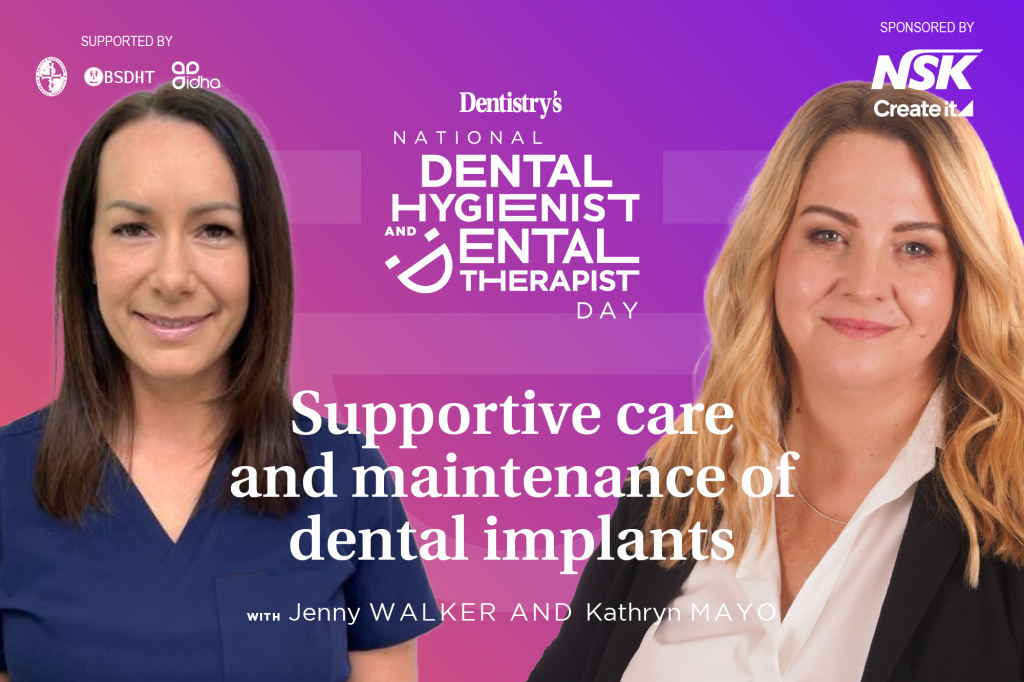
Jenny Walker and Kathryn Mayo explain the role of dental hygienists and dental therapists in maintaining dental implants.
With the continuing advances in dental technology and material science, dental implants have become the gold standard for restorations that look, feel and function like natural teeth. However, while demand for implants continues to rise, there is growing evidence of the susceptibility of implant patients to peri-implant diseases. These include peri-mucositis and peri-implantitis, which may result in implant failure.
Dental hygienists and therapists play an integral role in the early detection of implant diseases. Also, the provision of individualised patient care in the maintenance protocol. Therefore, awareness of risk factors for peri-implant disease and early disease detection is essential for appropriate management.
A team approach to implant therapy and education on the importance of supportive care for patients is paramount. This should include, but is not limited to, periodontal assessments, risk assessments and gaining patient consent. The patient should be fully informed of the recommended post therapy supportive care commitment before embarking on their implant journey.
Maintenance protocol
Research has shown that patients who receive supportive implant therapy are associated with a lower incidence of peri-implant disease. Patients without regular maintenance might exhibit a 4.25-fold increased risk for peri-implantitis. Supportive therapy should therefore be considered essential (Frisch et al, 2020).
In maintenance therapy, collecting the necessary baseline data to refer to is key to identifying early signs of peri-implant disease. Biofilm-induced peri-implant mucositis is a reversable condition and a precursor to peri-implantitis. Therefore it is crucial that peri-mucositis is detected as early as possible in an effort to reverse the condition.
Plaque and biofilm removal
Implant maintenance includes professional mechanical plaque removal (PMPR) to remove dental plaque biofilm and plaque retentive factors on natural teeth and dental implants both supra and sub-gingivally/marginally. PMPR is an essential component for plaque control, particularly in patients with full-arch fixed implant-supported prostheses (Yang et al, 2021).
Air polishing (with low abrasive, soft powders) is a highly efficient method of disrupting biofilm around dental implants. Evoking the least surface alteration of any mode of instrumentation, it provides a minimally invasive approach for access around and underneath implant prostheses and structures. It is an extremely simple, quick and comfortable treatment. It is is very well accepted by patients and may also contribute to recall compliance.
Ultrasonic devices have certain applications for use around implants, particularly in peri-implantitis where the device may work well on implant threads. It should be noted that any ultrasonic utilising stainless steel tips will significantly alter the implant surface. Therefore a ‘benefit versus harm’ approach should be adopted. Plaque retentive factors on implants are generally less tenacious than on natural teeth. When considering potential surface alteration, using on low power is recommended.
The NSK Varios Combi Pro is a device that combines ultrasonic scaling and powder therapy for highly effective implant maintenance. The Varios Combi Pro has detachable chambers and handpieces making it easy to switch between supragingival (enamel only) application to remove staining and subgingival application to disrupt biofilm below the gumline. In the case of implants only the sub-gingival chamber is used in conjunction with appropriate powder.
A team approach
Ultimately, it is the role of the whole dental team to support patients throughout the implant journey, encouraging them to maintain optimal home biofilm control and long-term engagement with supportive care programmes.
The team should also be prepared to respond to changes in risk factors which may occur with increasing age and adapt their approach accordingly to ensure longevity of the implant work. While retention of natural teeth, where possible, should be prioritised, dental implants offer a solution for missing teeth which can significantly enhance a patient’s quality of life.
Comprehensive implant supportive management
For hygienists and therapists looking to expand their knowledge on dental implant maintenance, Kathryn Mayo and Jenny Walker are running an exclusive NSK Ikigai Live event ‘Comprehensive implant supportive management’ on Saturday 2 November 2024 in North London. This course comprises a full day of lectures and hands-on sessions exploring the principles of managing and supporting patients throughout their implant journey from a dental hygiene perspective.
For full details and to book visit mynsk.co.uk/ikigai/live/.
For more information on the Varios Combi Pro visit www.uk.nsk-dental.com/products/oral-hygiene/oral-vcp/.
References
- Frisch E, Vach K, Ratka-Krueger P. Impact of supportive implant therapy on peri-implant diseases: A retrospective 7-year study. J Clin Periodontal. 2020 Jan;47(1):101-109. doi: 10.1111/jcpe.13206. Epub 2019 Nov 6. PMID: 31599464
- Yang J, et al. BMJ Open 2021;11:e053286. doi:10.1136/bmjopen-2021-053286.

